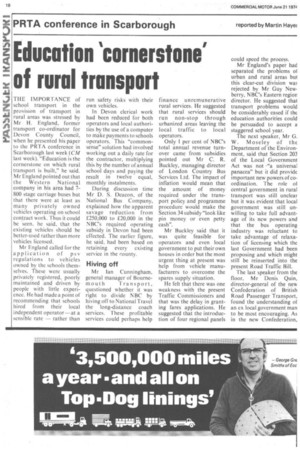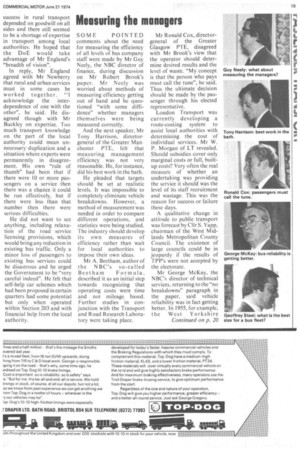Education 'cornerstone' of rural transport
Page 20

Page 21

If you've noticed an error in this article please click here to report it so we can fix it.
THE IMPORTANCE of school transport in the provision of transport in rural areas was stressed by Mr H. England, former transport co-ordinator for Devon County Council, when he presented his paper to the PRTA conference in Scarborough last week (CM last week). "Education is the cornerstone on which rural transport is built," he said. Mr England pointed out that the Western National company in his area had 7800 stage carriage buses but that there were at least as many privately owned vehicles operating on school contract work. Thus it could be seen, he said, that the existing vehicles should be better-used rather than more vehicles licensed.
Mr England called for the application of psv regulations to vehicles owned by the schools themselves. These were usually privately registered, poorly maintained and driven by people with little experience. He had made a point of recommending that schools hired from their local independent operator —at a .sensible rate — rather than run safety risks with their own vehicles.
In Devon clerical work had been reduced for both operators and local authorities by the use of a computer to make payments to schools operators. This "commonsense" solution had involved working out a daily rate for the contractor, multiplying this by the number of annual school days and paying the result in twelve equal, monthly instalments.
During discussion time Mr D. S. Deacon, of the National Bus Company, explained how the apparent savage reduction from £250,000 to £20,000 in the NBC's required operating subsidy in Devon had been effected. The earlier figure, he said, had been based on retaining every existing service in the county.
Hiving off
Mr Ian Cunningham, general manager of Bourne mouth Transport, questioned whether it was right to divide NBC by hiving off to National Travel the long-distance coach services. These profitable services could perhaps help finance unremunerative rural services. He suggested that rural services should run non-stop through urbanized areas leaving the local traffic to local operators.
Only 1 per cent of NBC's total annual revenue turnover came from subsidies pointed out Mr C. R. Buckley, managing director of London Country Bus Services Ltd. The impact of inflation would mean that the amount of money required under the transport policy and programme procedure would make the Section 34 subsidy "look like pin money or even petty cash".
Mr Buckley said that it was quite feasible for operators and even local government to put their own houses in order but the most urgent thing at present was help from vehicle manufacturers to overcome the spares supply situation.
He felt that there was one weakness with the present Traffic Commissioners and that was the delay in granting fares applications. He suggested that the introduction of four regional panels could speed the process.
Mr England's paper had separated the problems of urban and rural areas but this clear-cut division wa5 rejected by Mr Guy Newberry, NBC's Eastern region director. He suggested that transport problems would be considerably eased if the education authorities could be persuaded to accept a staggered school year.
The next speaker, Mr G. W. Moseley of the Department of the Environment, said that Section 203 of the Local Government Act was not ."a universal panacea" but it did provide important new powers of coordination. The role of central government in rural transport was still unclear but it was evident that local government was still unwilling to take full advantage of its new powers and that the bus operating industry was reluctant to take advantage of relaxation of licensing which the last Government had been proposing and which might still be reinserted into the present Road Traffic Bill.
The last speaker from the floor, Mr Denis Quin, director-general of the new Confederation of British Road Passenger Transport, found the understanding of an ex local government man to be most encouraging. As in the new Confederation, success in rural transport depended on goodwill on all sides and there still seemed to be a shortage of expertise in transport among local authorities. He hoped that the DoE would take advantage of Mr England's "breadth of vision".
In reply, Mr England agreed with Mr Newberry that rural and urban services must in some cases be worked together. "I acknowledge the interdependence of one with the other", he said. He disagreed though with Mr Buckley on expertise. Too much transport knowledge on the part of the local authority could mean unnecessary duplication and a situation where experts were permanently in disagreement. His own "rule of thumb" had been that if there were 10 or more passengers on a service then there was a chance it could be run effectively, but if there were less than that number then there were serious difficulties.
He did not want to see anything, including relaxation of the road service licensing provisions, which would bring any reduction in existing bus traffic. Only a minor loss of passengers to existing bus services could be disastrous and he urged the Government to be "very careful indeed". He felt that self-help car schemes which had been proposed in certain quarters had some potential but only when operated within Section 203 and with financial help from the local authority.








































































































